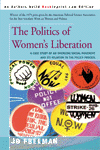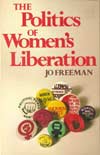|
"Jo Freeman is one of the most perceptive participants in the movement for women's liberation This book is required reading for those who would understand its politics."
— Jerome Skolnick, University of California, Berkeley
"It is a book to read without wincing, a real "high." It is one of those rarities, a highly original book, tracing the origins and development of the current wave of women's liberation. Since I am quite familiar with the feminist movement, I had not expected to learn a great deal but found myself activated and rejuvenated by the positive driving force of the book."
— Cathryn Adamsky, Purdue University
"Up to now, nobody has been sure what the women's liberation movement is, we just know it is happening. Jo Freeman makes up for feminism's peculiar lack of political analysis."
— Nancy Borman, Majority Report
"Jo Freeman's enlightening study transcends the limits of group theory, significantly enriches the literature on social movements, and contributes new perspectives to the assessment of alternative means of political organization."
— Ira Katznelson, University of Chicago
"It is a shrewd, discriminating, and lively exploration of American interest groups and social movements; a major contribution to American interest group and public policy articulation. This study of the women's movement breaks new ground and refutes old ideas about the conditions under which power is organized, used, and implemented in America."
— Edgar Litt, University of Connecticut
"If you want to know what's happening in the women's movement, what it means, how it began and where it is going, then Jo Freeman's book is the one to read. Her lively analysis of the many facets of the women's movement is a happy combination of a fine feminist approach, sharply honed by a solid political science background."
— Bernice Sandler
PRIZE
CITATION:
APSA PRIZE FOR THE BEST SCHOLARLY WORK ON WOMEN IN POLITICS
The American
Political Science Association
1527 New Hampshire Avenue, N.W.
Washington, D.C. 20036
Awarded at the annual meeting held in September 1975
"The decision of the American Political Science Association to offer
a prize for the best scholarly work on women in politics to mark International
Women's Year brought its committee a dozen varied and interesting books
and manuscripts from which to make a selection. In judging them, the committee
used four criteria: The originality of the research, in terms of topic
and methodology; the quality of its level of analysis; the effectiveness
of its communication; and the recognition by the author of the limitations
of the data used, and of possible biases in its use.
![]() On
this basis, the entry selected to receive the prize for the best scholarly
work on women in politics was Jo Freeman's The Politics of Women's
Liberation: A Case Study of an Emerging Social Movement and Its Relation
to the Policy Process, published by David McKay Co. Ms. Freeman analyzes
the evolution and character of the women's movement of the 1960s and 1970s
with clarity and verve, effectively exploring the interaction between
group action and public policy. In addition to using a wealth of background
material, she has extensively interviewed a large number of individuals
who were directly involved in women's movements, as well as people in
government, the press and elsewhere who had an effect upon these movements.
While she demonstrated a healthy awareness of the limitations of her data,
she provided new insights and a useful framework within which to continue
to analyze the relation between women's movements and public policy.
On
this basis, the entry selected to receive the prize for the best scholarly
work on women in politics was Jo Freeman's The Politics of Women's
Liberation: A Case Study of an Emerging Social Movement and Its Relation
to the Policy Process, published by David McKay Co. Ms. Freeman analyzes
the evolution and character of the women's movement of the 1960s and 1970s
with clarity and verve, effectively exploring the interaction between
group action and public policy. In addition to using a wealth of background
material, she has extensively interviewed a large number of individuals
who were directly involved in women's movements, as well as people in
government, the press and elsewhere who had an effect upon these movements.
While she demonstrated a healthy awareness of the limitations of her data,
she provided new insights and a useful framework within which to continue
to analyze the relation between women's movements and public policy.
![]() Two
works which were both concerned with women in state legislatures were
selected for honorable mention: Jeane J. Kirkpatrick's Political Woman,
published by Basic Books, and Irene G. Diamond's unpublished dissertation
for Princeton University, entitled Women and the State Legislatures:
A Macro and Micro Analysis.
Two
works which were both concerned with women in state legislatures were
selected for honorable mention: Jeane J. Kirkpatrick's Political Woman,
published by Basic Books, and Irene G. Diamond's unpublished dissertation
for Princeton University, entitled Women and the State Legislatures:
A Macro and Micro Analysis.
![]() The
Committee -- Gwendolen M. Carter of Indiana University, James David Barber
of Duke University, and Dorothy Buckton James of Virginia Polytechnic
Institute and State University, congratulates all three authors on their
work, and particularly Ms. Freeman who received the prize. Their excellent
studies push ahead our knowledge and understanding of the character and
role of women's movements and women in electoral politics in the United
States, and their relation to public policy."
The
Committee -- Gwendolen M. Carter of Indiana University, James David Barber
of Duke University, and Dorothy Buckton James of Virginia Polytechnic
Institute and State University, congratulates all three authors on their
work, and particularly Ms. Freeman who received the prize. Their excellent
studies push ahead our knowledge and understanding of the character and
role of women's movements and women in electoral politics in the United
States, and their relation to public policy."
Publisher's Weekly, February 24, 1975.
Harrison, Cynthia, Library Journal, March 15, 1975.
Flander, Judy, The Washington Star, July 6, 1975.
Goodman, Ellen, "Feminism brought up to date," the Boston Globe, July 16, 1975
The Spokeswoman, August 15, 1975, p. 8.
Sherr, Lynn, The New York Times Book Review, October 5, 1975, pp. 38, 40.
Matera, Mariane, "Women's Lib Dissected," Richmond News-Leader, Richmond, Virginia, November 5, 1975.
Yatrakis, Kathryn B., Political Science Quarterly, Vol. 90, No. 4, Winter, 1975-76, pp. 790-91.
Bay, Debbie, Matrix, Winter 1975-76.
Jaquette, Jane, "Assessing the Women's Movement", Signs, Vol. 2, No. 1, Autumn 1976, pp. 154-5.
Allen, Donna, "Jo Freeman Recounts Early Media Interaction --Movement and "Straight" Media," Media Report to Women, November 1, 1976, p. 8.
Thorne, Barrie, Sex Roles, Vol. 2:1, 1976, pp. 98-101.
Revue Française de Science Politique, Paris, France, Juin 1976.
Swiebel, Joke, "Freeman over beweging en beleid," Folioge, feminist quarterly from the Netherlands, No. 4, 1976, pp. 9-11.
Books by Jo | What's New | About Jo | Photos | Political Buttons
Home | Search | Links | Contact Jo | Articles by Jo

